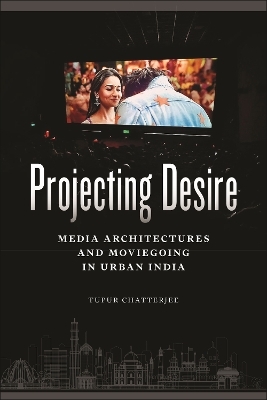
Projecting Desire
Media Architectures and Moviegoing in Urban India
Seiten
2025
New York University Press (Verlag)
978-1-4798-2962-0 (ISBN)
New York University Press (Verlag)
978-1-4798-2962-0 (ISBN)
- Lieferbar (Termin unbekannt)
- Versandkostenfrei
- Auch auf Rechnung
- Artikel merken
How middle-class women transformed India’s screen and exhibition industries
Since the late 90s, multiplexes in India have almost always been located inside malls, rendering it impossible to inhabit one space without also inhabiting the other. Their prevalence coincides with a shift in the spectatorial imagination of India’s mass audience—spaces that, for several preceding decades, had been designed for the subaltern male, but are now built for the consuming, globalized middle-class woman. By catering to the mutable desires and anxieties of a rapidly expanding and heterogeneous middle class, the mall-multiplex has radically altered the politics of theatrical space and moviegoing.
Projecting Desire tells the story of this moment of historic transition as it played out across media industries, architecture and design, popular cinema, and public culture. Tupur Chatterjee highlights how the multiplex established a new link between media and architecture in the subcontinent, not only rewriting the relation between gender and urban space, but also changing the shapes of Indian cities.
Projecting Desire locates the post-globalization transformation of India’s screen and exhibition industries in a longer arc of ideas about urban planning and architecture, long mired in caste- and class-based gendered anxieties. It argues that the architectural mediations of India’s moviegoing cultures are key to imagining, planning, and policing the contemporary media city. Chatterjee integrates industrial and organizational ethnography, in-depth interviews, participant observation, discourse and textual analysis, and archival work with spatial and urban histories. Focusing on these new meccas of leisure and entertainment, Projecting Desire tracks the understudied nexus between new media architectures, cultures of public leisure, and popular cinema in the Global South.
Since the late 90s, multiplexes in India have almost always been located inside malls, rendering it impossible to inhabit one space without also inhabiting the other. Their prevalence coincides with a shift in the spectatorial imagination of India’s mass audience—spaces that, for several preceding decades, had been designed for the subaltern male, but are now built for the consuming, globalized middle-class woman. By catering to the mutable desires and anxieties of a rapidly expanding and heterogeneous middle class, the mall-multiplex has radically altered the politics of theatrical space and moviegoing.
Projecting Desire tells the story of this moment of historic transition as it played out across media industries, architecture and design, popular cinema, and public culture. Tupur Chatterjee highlights how the multiplex established a new link between media and architecture in the subcontinent, not only rewriting the relation between gender and urban space, but also changing the shapes of Indian cities.
Projecting Desire locates the post-globalization transformation of India’s screen and exhibition industries in a longer arc of ideas about urban planning and architecture, long mired in caste- and class-based gendered anxieties. It argues that the architectural mediations of India’s moviegoing cultures are key to imagining, planning, and policing the contemporary media city. Chatterjee integrates industrial and organizational ethnography, in-depth interviews, participant observation, discourse and textual analysis, and archival work with spatial and urban histories. Focusing on these new meccas of leisure and entertainment, Projecting Desire tracks the understudied nexus between new media architectures, cultures of public leisure, and popular cinema in the Global South.
Tupur Chatterjee is Assistant Professor in Global Film and Media in the Department of English, Drama, and Film at University College Dublin.
| Erscheinungsdatum | 10.12.2024 |
|---|---|
| Reihe/Serie | Critical Cultural Communication |
| Zusatzinfo | 18 b&w images |
| Verlagsort | New York |
| Sprache | englisch |
| Maße | 152 x 229 mm |
| Themenwelt | Sozialwissenschaften ► Kommunikation / Medien ► Medienwissenschaft |
| Sozialwissenschaften ► Soziologie ► Gender Studies | |
| ISBN-10 | 1-4798-2962-5 / 1479829625 |
| ISBN-13 | 978-1-4798-2962-0 / 9781479829620 |
| Zustand | Neuware |
| Informationen gemäß Produktsicherheitsverordnung (GPSR) | |
| Haben Sie eine Frage zum Produkt? |
Mehr entdecken
aus dem Bereich
aus dem Bereich
wie KI und virtuelle Welten von uns Besitz ergreifen – und die …
Buch | Hardcover (2023)
Heyne (Verlag)
CHF 29,90
Buch | Softcover (2023)
Passagen (Verlag)
CHF 25,20


